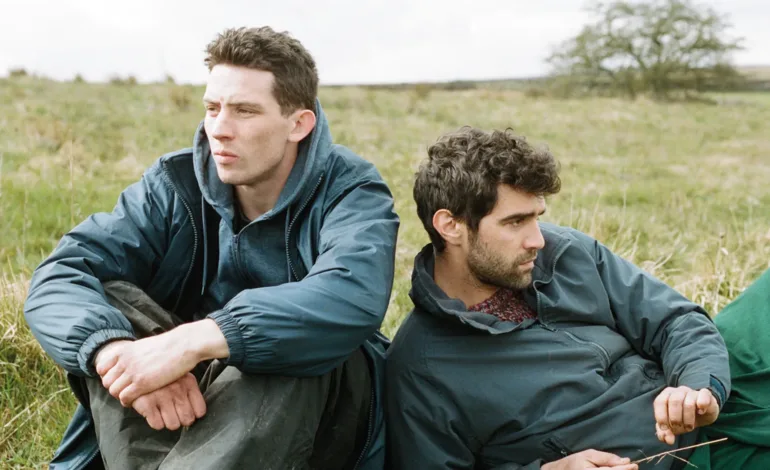People have tagged God’s Own Country as “Yorkshire’s Brokeback Mountain,” but honestly, that’s like calling a fine single malt just another whisky. Sure, they’re both love stories between men in the rugged countryside, but Francis Lee’s film digs its muddy boots into the Yorkshire soil and refuses to be neatly pigeonholed.
The Yorkshire countryside is as much a character here as the humans trudging through it—beautiful, yes, but also brutal, a place where the landscape mirrors the loneliness that hangs in the air like a damp mist. “It’s beautiful here,” one character muses, taking in the rolling hills and moody skies, before delivering the kicker, “But lonely, no?” And there it is, the melancholy heart of God’s Own Country, beating quietly beneath the surface.
Enter Johnny Saxby, played by Josh O’Connor with the kind of brooding intensity that makes you want to give him a hug—if only you thought he wouldn’t shove you off in disgust. Johnny’s life is all early mornings, mud-caked boots, and the relentless grind of keeping the family farm afloat. His father’s gruff and his nan’s as weathered as the stone walls that crisscross the hills, and Johnny himself is spiraling into a pit of loneliness, booze, and furtive hookups that leave him as cold as the Yorkshire drizzle.
One of those hookups happens in a cattle truck with a vet, and it’s as quick and unromantic as you’d expect. This is not a man looking for love; he’s looking for an escape, even if it’s just for a few minutes. Romance? Johnny practically recoils at the thought, his life too entrenched in hardship to allow for anything as frivolous as feelings.
And then along comes Gheorghe, a Romanian farmhand who’s here to help out but ends up doing a lot more than just mending fences. Johnny greets Gheorghe with a spiky hostility, laced with the kind of casual racism that’s as much about self-loathing as it is about anything else. But up in the hills, away from prying eyes, something shifts. The mud, the cold, the hard labor—they all start to dissolve as Johnny and Gheorghe’s relationship moves from grudging respect to something deeper, something that feels like warmth in the otherwise unforgiving landscape.
Their first encounter is rough, primal, and covered in mud, yet somehow it carries the weight of something far more tender. Back at the farm, their relationship continues in secret, a series of stolen moments and loaded glances that speak volumes. There’s a restraint here, an Englishness, if you will, that’s more Brief Encounter than Brokeback Mountain. This isn’t all about grand declarations of love; it’s about the quiet, almost imperceptible shifts in a man who’s spent his life shutting everyone out.
And while this love story unfolds, the farm work doesn’t stop. The drudgery of agricultural life in Britain today is unflinchingly portrayed—this is not the romanticized countryside of picture postcards. When Johnny’s father suffers a stroke, leaving the future of the farm in Johnny’s hands, O’Connor delivers a gut-punch of a performance. You see the realization dawn on him that he’s staring down a lifetime of back-breaking labor, and for a moment, it’s as though all the air has been sucked out of the room.
Yet, amid the grit and the graft, there’s something undeniably hopeful about God’s Own Country. It’s in the tentative romance between Johnny and Gheorghe, in the way they slowly, carefully, let each other in. It’s in the moments of quiet connection, as rare and precious as a ray of sunshine piercing through the relentless grey of a Yorkshire spring. This isn’t just a British Brokeback Mountain—it’s a film that stands on its own, unflinching in its portrayal of rural life, yet quietly, achingly romantic at its core.
